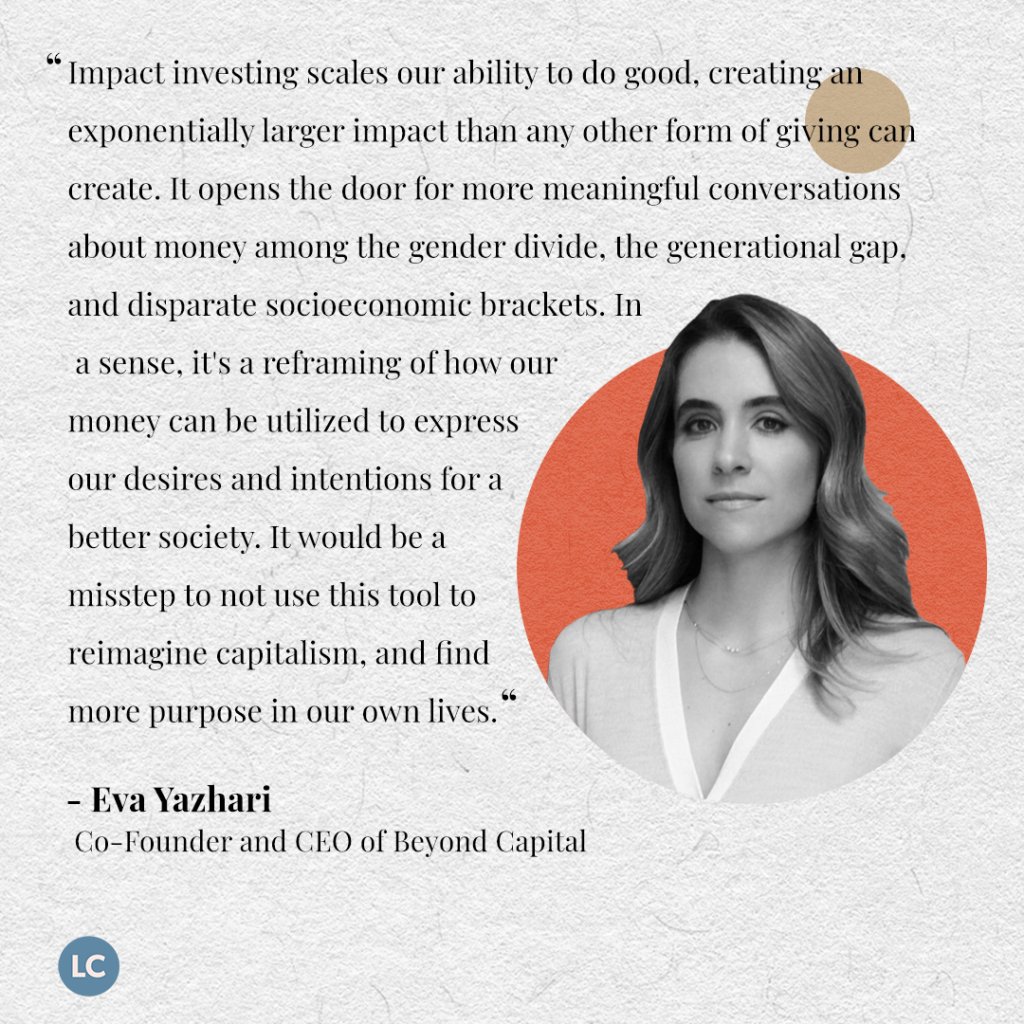How We Think About ESG Investing: People, Planet & Profit
The new frontier of environmental, social, and governance (ESG) investing is upon us—and private capital must play a critical role in addressing the intractable, systemic global issues that affect our planet and humanity. ESG investing that goes beyond “doing no harm”—and is instead creating value and actively integrated into a company’s investment strategy and purpose—is, at its core, a game changer. And as the global corporate and financial industries strive to eliminate greenhouse gas emissions by 2050, the way in which we accelerate and amplify ESG investing over the next decade is crucial.
Simultaneously, this entails finding investment opportunities that can generate tangible and sustainable impact among the billions of underserved consumers and people still living in poverty today—those who are most affected by climate change. This could range from powering local entrepreneurship, to investing in local conscious company leaders, to ensuring those living in poverty have access to affordable financial tools—allowing them to participate as consumers and purchase the goods and services they need. Global companies have a vested interest in ensuring their ESG investment strategies tackle these issues in ways that generate both attractive financial returns and measurable social impact returns—what we call impact investing. While ESG investing is often focused on screening out negative investments, impact investing is all about creating value.
Eva Yazhari, Co-Founder and CEO of Beyond Capital Ventures and Beyond Capital Fund—in her book, The Good Your Money Can Do: Becoming a Conscious Investor—rightly puts it this way: "Impact investing scales our ability to do good, creating an exponentially larger impact than any other form of giving can create. It opens the door for more meaningful conversations about money among the gender divide, the generational gap, and disparate socioeconomic brackets. In a sense, it's a reframing of how our money can be utilized to express our desires and intentions for a better society. It would be a misstep to not use this tool to reimagine capitalism, and find more purpose in our own lives.”
In a world where stakeholder capitalism is a necessity, companies operating in emerging markets today have the opportunity to gain a real competitive advantage by investing strategically in ways that meet ESG criteria, generate impact, and create new customers.
“Companies have responsibilities to all of their stakeholders—shareholders, clients, employees, and partners in the communities where they operate. There is an increasing expectation that companies should integrate ESG considerations and impact into their core purpose, strategy, and operations,” Anne Finucane, Vice Chairman at Bank of America, recently stated. “This is being driven by three big dynamics: 1) widespread understanding and agreement that there are large, systemic global issues that we must address urgently; 2) the growing belief that corporations have a role and responsibility to address these issues (stakeholder capitalism); and 3) an increased understanding—validated by Bank of America Global Research—that companies that manage ESG well perform better over time. This, in turn, helps prompt investors to direct capital toward companies with strong ESG characteristics.”
Imagine what would happen if these companies took a step further and succeeded with impact investing on a massive scale. Their competitive advantage would be monumental. While this high-risk, high-reward mindset exists in traditional business circles, it is lacking in impact investing, ESG investing—and philanthropy. The result is a missed opportunity.
Countless studies have shown evidence that companies’ approaches to ESG have a measurable impact on their financial performance, and this has led to asset managers increasingly integrating ESG criteria into their investment processes. However, ESG investing has to go beyond traditional norms and take a far more active approach—really tapping into a growing portfolio of impact investment opportunities that are truly generating a triple bottom line: people, planet, and profit. That includes investing in opportunities that move the needle toward achieving the United Nations’ Sustainable Development Goals (SDGs). Achieving these goals will ensure a sustainable future for all. The global corporate and financial industries stand to gain significantly by making this shift—as opposed to remaining complacent and losing relevance, employees, customers, investors, brand recognition, local community partners, and market share, particularly in emerging markets that are vulnerable to climate change. And during a time where rampant and rising global inequality is one of the greatest threats to our collective future and well-being. As Jacqueline Novogratz, Founder and CEO of Acumen—and author of The Blue Sweater and Manifesto for a Moral Revolution—shares, “The pandemic has cracked open all of our systems, and exposed the wounds. The business community has never had a moment like now, to be a leader of the solutions.
ESG Equals SDG
In order to achieve a better and more sustainable future for all by 2030, it’s key to recognize that ESG should be deeply intertwined with the SDGs. And that means addressing and tackling the greatest, most intractable global challenges we face—poverty, gender and racial inequality, climate change, unclean energy, the water crisis, lack of access to education, and lack of social justice—and doing so imminently.
If ESG-based investment decisions are directed toward long-term value creation for both business and society, it draws a direct connection to the SDGs’ concept of creating “shared value.” This represents the convergence of market potential, societal demands, and policy action for a sustainable and inclusive approach to economic growth and well-being. As such, whether tangibly or intangibly, all of the 17 goals can be attributed to individual elements of ESG considerations.
Breaking it Down
Often, in their ESG strategy, the global financial and business industries focus solely on the “E,” and neglect to recognize the importance of the “S” and “G.” However, all three pillars together represent the greatest opportunity for shared value and tremendous societal impact:
Environmental: carbon emissions, water and waste management, raw material sourcing, climate change vulnerability
Social: diversity, equity, and inclusion, labor management, data privacy and security, community relations
Governance: board governance, business ethics, intellectual property protection
What we do in the next decade will be absolutely critical to the future of our humanity and the sustainability of our planet. We’ve heard the year 2050 tossed around as the deadline for reversing climate change. But in reality, we only have until 2030 to avert a climate catastrophe. What does that mean today? It means leaders must set ambitious targets and make early investments in order to gain a competitive edge. It means total global carbon emissions will have to be halved within the next decade. And to compensate for the laggards, leaders have to overshoot that target. We agree with Impact Alpha: The math is brutal—which is why accelerating the acceleration is the only way forward.
Our Role
Philanthropy shouldn't be so complicated. Making a difference shouldn't be complicated. Creating your greatest impact shouldn't be so complicated.
Our role at Lebec Consulting is to act as your partner and advisor in constructing a portfolio of opportunities at the intersection of ESG’s new frontier and real social impact—systemic change. Our goal is to help you achieve your greatest impact through venture philanthropy and impact investing—including ESG investing.
In many cases, investors and philanthropists are playing it too safe across the entire spectrum, from philanthropic grants to impact investments—missing the monumental opportunity we have before us today to make real change happen, while achieving that triple bottom line. A majority of today’s approaches simply won’t create revolutionary change that is deeply needed—for example, lifting a billion people out of poverty. We need bold action. The longer we wait, the greater the costs and the complexity of resolving today’s global systemic challenges. Timing is of the essence—and we need cutting-edge venture philanthropy and impact investing. This is ultimately where the greatest return on investment lies.
If you want to understand how you can optimize your philanthropic or impact investing strategy—and ensure that it’s competitive and at the forefront of systemic change—we exist to be your partner in this. We’ve been in the trenches, doing this work for over a decade. We know how to make real change happen. And while ESG hasn't fully hit its stride—now is exactly the time to lead by example and make it happen.
About Lebec Consulting
Lebec Consulting is a women-led firm that specializes in advising corporations, foundations, high-net-worth individuals, financial institutions, and entrepreneurs on how to achieve their greatest social impact through strategic philanthropy, impact investments, and ESG investing. With sustainability, innovation, and systems change at the center of our strategy, we think outside the box and look beyond traditional philanthropy. Our goal is to provide these key stakeholders with the best possible roadmap to achieve impact in ways that will truly reverse the tides of global inequality.



